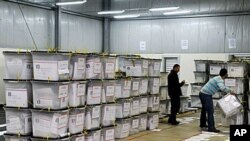Incumbent Prime Minister Hashim Thaci's Democratic Party of Kosovo has won the country's first parliamentary elections since it declared independence from Serbia nearly three years ago. Mr. Thaci's challenge now is to form a coalition government in the 120-member parliament to tackle the challenges that lie ahead.
The official election results came late on Monday evening.
Valdete Daka, the president of the Central Election Commission announced that incumbent Prime Minister Hashim Thaci's Democratic Party of Kosovo had won with 33.5 percent of the vote. The Democratic League of Kosovo, led by Isa Mustafa, received 23.6 percent of the ballots cast.
The Democratic Party's inability to win an outright majority means that Mr. Thaci will need to form a coalition government with his party's rivals.
That won't be easy, says political analyst Krenar Gashi of the Kosovo Institute for Policy Research and Development.
"Prime Minister Thaci and his Democratic Party of Kosovo managed to get the first position and will probably be the party to get the first mandate to form the government. However the second, the third and the fourth party have openly declared that they don't want to enter any coalition with Prime Minister Thaci," said Gashi.
Opposition parties are claiming election fraud and demanding a re-vote after a 95 percent turnout was reported in two districts. But across Kosovo, E.U. observers say they generally are happy with the way the election was conducted.
Kristina Herodes is judicial spokeswoman for the E.U. rule of law mission in Kosovo. "The security situation was calm and quiet. There were some incidents, but not major ones. We had around 500 police officers ready if something happened . But fortunately, nothing happened," she said.
Analysts say the biggest apparent election flaw was the boycott of the vote by ethnic Serbs in the north. Belgrade has refused to recognized Kosovo's independence since it broke away from Serbia.
Political analyst Krenar Gashi said, "It's very significant. For the first time, Serbia openly expressed its ambition for the partition of Kosovo and this is now slowly becoming the official policy of the Belgrade government."
Prime Minister Thaci has repeatedly stated his desire for Kosovo to join the European Union. If he is to achieve that goal, analysts say Mr. Thaci needs to show E.U. observers that he has the authority to prevent Kosovo breaking apart and erupting into ethnic violence.
PM Thaci's Party Wins in Kosovo




